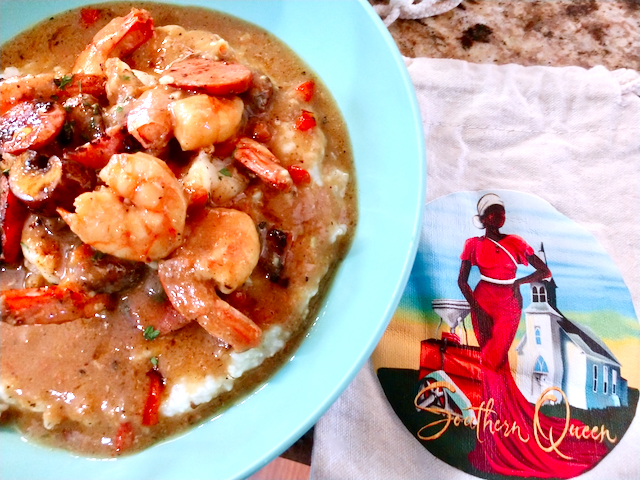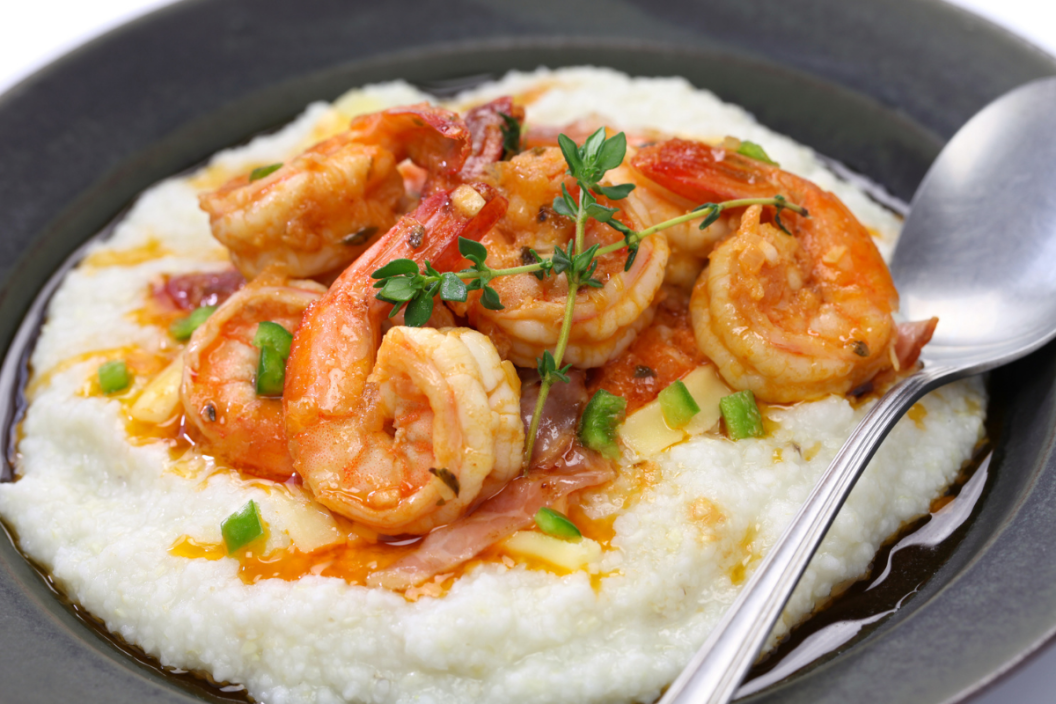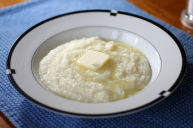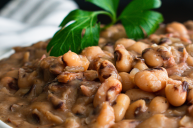Grits are so much more than just a modest ingredient. Emblematic of the south, rich with culture and history, and sustaining generation after generation, this seemingly small ingredient carries meaningful importance and deep resonance for so many. No matter if yellow or white, stone-ground or traditional, quick-cooking or regular, grits occupy a substantial portion of the Southern kitchen cabinet and hold a special place on so many dinner tables.
Grits are a prime example of comfort food. Smooth, creamy, and rich, grits are like a comforting porridge, and due to their inherently neutral flavor, they're also an excellent vehicle to carry other flavors such as butter, cheese, or cream.
Originated by the Natives who tended the land before being embraced as a staple ingredient in the culinary lexicon of the southern Black community, the humble grit speaks to the power and resilience of marginalized groups, the torrid history of the southern US, and of course - they make a darn good 'bed' for shrimp.

Southern Queen Foods
Tennessee State Museum notes that the essence and quality of homemade grits declined once corn became commodified, stripping much of the flavor and nutrient inherent in the ingredient and producing it mass-market. Over recent years, though, this has changed. Many companies are now focusing on milling grits from heirloom specialty corn varieties, repurposing the humble ingredient in a way that acknowledges its history while simultaneously celebrating the communities it fed for generations.
For a time, these artisanal grits companies were largely being operated by white men, which certainly ran counterproductive to the indigenous and black populations which originally initiated, cooked, and popularized the now-beloved grits. Southern Queen Foods is one of a few Black-owned, southern-based companies specializing in the production and sale of grits. They're also based out of South Carolina specifically, which just so happens to be the state which calls grits its official food. I reached out to the founder, Kirk Wardy, to delve into the importance of grits, the specifics of what makes his grits unique, and the bridge between the grits dishes of the past and their significance in the present day.
This interview has been lightly edited for clarity, length, and comprehension.
Wide Open Eats: Grits are so important in the history of southern culture and gastronomy. How did that significance play into your decision to start the company?
Southern Queen Foods: We wanted to bring back the tradition of how our grandparents produced and consumed grits. They had to grow their own corn, let it dry out, and then they took it to a mill to be ground into grits and cornmeal. We wanted something more traditional in comparison to the large mass production that typically occurs. We just wanted to pay homage to our past especially since grits have always been a staple at our grandparents' home.
WOE: Do you have any special memories of grits or grits-forward meals?
SQF: My mother was born and raised in South Carolina. She moved to New York as a young adult and we lived there until I was around 11. Growing up in New York, we ate cream of wheat and sometimes oatmeal for breakfast. When we moved to South Carolina, I was not used to eating grits. My grandmother who lived in South Carolina introduced me to grits and literally had to make me eat them. Therefore, my early memories of grits were not that pleasant. They did not taste like cream of wheat, so I did not like them. It was not until I became an adult with a more sophisticated palate that I began to appreciate grits.
WOE: Do you have any interesting, helpful, or unique tips for cooking grits?
SQF: You can soak them overnight before cooking them. You can use other liquids like stock to cook them instead of water, but always season the water (liquid) before adding the grits, and you have to constantly stir grits to prevent them from getting lumps.
WOE: What are the nutritional aspects of your grits?
SQF: They are gluten-free, have no added sugar, 32 grams of carbohydrates, 3 grams of fiber, and 1 gram of fat per serving (which is ¼ cup raw).
WOE: What does it mean if grits are stone ground?
SQF: In simplest terms, stone grinding is old school. It allows the germ to stay intact unlike when you use other grinding methods. This allows more of the nutrient to stay with the grits.
WOE: Is there a difference in flavor between white and yellow grits?
That is so debatable and really just depends on your region. They are both made from corn— one is yellow and the other is white. People swear by their preference which is typically based on where they live and what they grew up eating.
WOE: Any tips for storage, variations, or leftover usage?
Since our grits do not have preservatives or additives, the best way to store them is in an airtight container in the freezer or refrigerator. Some people fry their left-over grits like a patty (grit cake) but we just give ours to the chickens.
WOE: What are your best-selling products? What is your personal favorite? Do you aim to sell more than grits in the future?
SQF: We sell an equal amount of yellow and white grits. We recently began selling cornmeal, which is a byproduct of corn in the grinding process of making grits. In the future, we plan to add other products that highlight our southern culture such as rice and possibly merchandise. We are really excited about our upcoming dinner series. The dinner series will highlight talented national and international chefs and each will feature a unique grits dish among other dishes.
WOE: Is there anything else you'd like our readers to know about your company, or grits in general?
We are a small family company that is growing and we appreciate all of our current and future customers. We hope to bring our love of grits and southern culture in general to more people. Oh, and eat more grits, especially from Southern Queen Foods!
WOE: Amazing - thank you so much for chatting with us!




